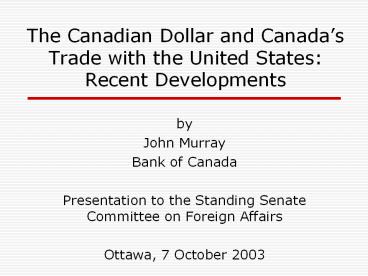The Canadian Dollar and Canada - PowerPoint PPT Presentation
1 / 29
Title:
The Canadian Dollar and Canada
Description:
The Canadian Dollar and Canada s Trade with the United States: Recent Developments by John Murray Bank of Canada Presentation to the Standing Senate Committee on ... – PowerPoint PPT presentation
Number of Views:219
Avg rating:3.0/5.0
Title: The Canadian Dollar and Canada
1
The Canadian Dollar and Canadas Trade with the
United StatesRecent Developments
- by
- John Murray
- Bank of Canada
- Presentation to the Standing Senate Committee on
Foreign Affairs - Ottawa, 7 October 2003
2
Introduction
- Renewed interest in exchange rate volatility and
trade - Four major messages in my presentation
- the recent moves have not been that unusual
- fundamental and unavoidable forces are probably
at work - there is an up side to a stronger dollar
- a floating exchange rate is still the best option
for Canada
3
Putting the Recent Appreciationin Perspective
- Sharp appreciation of the Cdn. dollar in the
spring of 2003 (Graph 1) - Part of a more general appreciation against the
US dollar (Graph 2) - Similar to other movements over the 1975-2003
period (Graph 3)
4
Putting the Recent Appreciationin Perspective
(contd)
- Cdn. dollar typically more stable than other
floating currencies (Graph 4) - Real vs. nominal movements and Canadas
competitiveness (Graph 5) - The importance of the bilateral Can-US exchange
rate to Canada
5
Possible Causes of the Appreciation
- A strong Canadian economy, rising world commodity
prices, and an improving outlook for the global
economy - Broad movements in the Cdn. dollar are usually
driven by fundamentals - The Banks exchange rate equation and four
critical variables -- interest rates, inflation
and two commodity prices (Graph 6) - Unsustainable trade deficits in the US and a need
to rebalance the global economy Asia as an
importance challenge (Graphs 7-10)
6
Canadas Trade with the US
- The importance of trade for the Canadian economy,
and greater integration of the North American
economy post-NAFTA (Graphs 11 and 12) - Structural differences between the Cdn. and
US economies, and the importance of commodities
7
Canadas Trade with the US (Contd)
- Steady improvement in Canadas trade balance and
net foreign investment position since mid-1990s
(Graphs 13 and 14) - Factors that have contributed to Canadas strong
external position (and recent weakness)
8
Effects of an Appreciation on Canadas Trade
- Canadas net exports and movements in the real
exchange rate (Graph 15) - The uneven impact across industrial sectors --
exports and imported inputs as a share of
production, and import competition
9
Effects of an Appreciation on Canadas Trade
(contd)
- Machinery, electrical and electronic products
more exposed, while food, beverage and refined
petroleum products are less exposed - Advantages of a stronger Cdn. dollar -- an
improvement in our terms of trade cheaper
imports and potential productivity gains
10
Pros and Cons of Alternative Exchange Rate Regimes
- The advantages of a flexible exchange rate
policy independence and (partial) insulation from
external shocks - The limited costs of short-run exchange rate
volatility - The costs of pegged exchange rates and other
semi-fixed arrangements -- increased
vulnerability to financial crises
11
Pros and Cons of Alternative Exchange Rate
Regimes (contd)
- New research on common currency arrangements --
Europe and the euro as an interesting experiment - Border effects and the (un)importance of separate
currencies
12
Conclusion
- The exchange rate typically moves in response to
broad fundamental forces - Some rebalancing of world trade and economic
activity in Canada is necessary and desirable - It is important to take a broad perspective on
trade and exchange rate developments, and not
view the exchange rate in isolation - Alternative exchange rate systems hold little
attraction for Canada at the present time
13
Canadas Main Trading Partners 2002
(using current dollars data on merchandise trade) (using current dollars data on merchandise trade) (using current dollars data on merchandise trade)
Share of Exports Share of Imports
United States 83.75 71.52
United Kingdom 1.51 2.89
Other E.U. 3.98 7.26
Japan 2.48 3.29
Other O.E.C.D. 2.98 5.52
All Other 5.30 9.52
Total 100.00 100.00
14
Structure of CanadasMerchandise Trade 2002
(using current dollars data) (using current dollars data) (using current dollars data)
Share of Exports Share of Imports
Agriculture 7.46 6.11
Energy 11.96 4.64
Raw and industrial materials 25.93 20.20
Machinery and equipment 23.49 29.70
Automobile products 23.42 22.85
Other 7.74 16.50
Total 100.00 100.00
15
(No Transcript)
16
(No Transcript)
17
(No Transcript)
18
(No Transcript)
19
(No Transcript)
20
(No Transcript)
21
(No Transcript)
22
(No Transcript)
23
(No Transcript)
24
(No Transcript)
25
(No Transcript)
26
(No Transcript)
27
(No Transcript)
28
(No Transcript)
29
(No Transcript)































